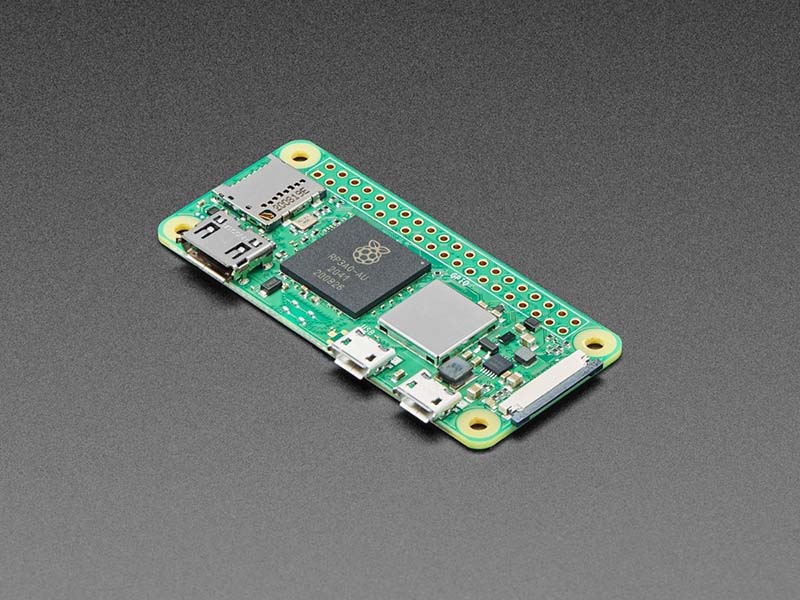
Zero 2 W by Raspberry Pi
NOTE: This build is alpha quality and is for experimental use. It is missing features and has known issues.
Raspberry Pi Zero 2 W is the latest product in Raspberry Pi’s most affordable range of single-board computers. The successor to the breakthrough Raspberry Pi Zero W, Raspberry Pi Zero 2 W is a form factor–compatible drop-in replacement for the original board.
The board incorporates a quad-core 64-bit Arm Cortex-A53 CPU, clocked at 1GHz. At its heart is a Raspberry Pi RP3A0 system-in-package (SiP), integrating a Broadcom BCM2710A1 die with 512MB of LPDDR2 SDRAM. The upgraded processor provides Raspberry Pi Zero 2 W with 40% more single-threaded performance, and five times more multi-threaded performance, than the original single-core Raspberry Pi Zero. Raspberry Pi Zero 2 W offers 2.4GHz 802.11 b/g/n wireless LAN and Bluetooth 4.2, along with support for Bluetooth Low Energy (BLE), and modular compliance certification.
The board has a microSD card slot, a CSI-2 camera connector, a USB On-The-Go (OTG) port, and an unpopulated footprint for a HAT-compatible 40-pin GPIO header. It is powered via a micro USB socket. Video output is via a mini HDMI port; composite video output can easily be made available via test points, if needed. Sharing the same form factor as the original Raspberry Pi Zero, Raspberry Pi Zero 2 W fits inside most existing Raspberry Pi Zero cases.
CircuitPython
These downloads are for CircuitPython standalone on the Raspberry Pi (not Blinka). There is no underlying operating system. It is in early development.
After installing the disk image on an SD card, the normal CircuitPython USB workflow is available over the micro-B USB connector labeled “USB”.
Purchase
Contribute
Have some info to add for this board? Edit the source for this page here.
CircuitPython 9.2.8
This is the latest stable release of CircuitPython that will work with the Zero 2 W. Use this release if you are new to CircuitPython.
Modules included in this download
_asyncio _bleio _pixelmap adafruit_bus_device adafruit_pixelbuf aesio array atexit binascii bitbangio bitmapfilter bitmaptools board builtins builtins.pow3 busdisplay busio busio.SPI busio.UART codeop collections digitalio displayio epaperdisplay errno fontio fourwire framebufferio getpass gifio i2cdisplaybus io jpegio json keypad keypad.KeyMatrix keypad.Keys keypad.ShiftRegisterKeys keypad_demux keypad_demux.DemuxKeyMatrix locale math microcontroller msgpack neopixel_write onewireio os os.getenv rainbowio random re rtc sdcardio sdioio select sharpdisplay storage struct supervisor sys terminalio tilepalettemapper time touchio traceback ulab usb_cdc usb_hid usb_midi vectorio videocore warnings zlibCircuitPython 10.0.0-alpha.8
This is the latest development release of CircuitPython that will work with the Zero 2 W.
Alpha development releases are early releases. They are unfinished, are likely to have bugs, and the features they provide may change. Beta releases may have some bugs and unfinished features, but should be suitable for many uses. A Release Candidate (rc) release is considered done and will become the next stable release, assuming no further issues are found.
Please try alpha, beta, and rc releases if you are able. Your testing is invaluable: it helps us uncover and find issues quickly.
Release Notes for 10.0.0-alpha.8
Modules included in this download
_asyncio _bleio _bleio (HCI co-processor) _pixelmap adafruit_bus_device adafruit_pixelbuf aesio array atexit binascii bitbangio bitmapfilter bitmaptools board builtins builtins.pow3 busdisplay busio busio.SPI busio.UART codeop collections digitalio displayio epaperdisplay errno fontio fourwire framebufferio getpass gifio i2cdisplaybus io jpegio json keypad keypad.KeyMatrix keypad.Keys keypad.ShiftRegisterKeys keypad_demux keypad_demux.DemuxKeyMatrix locale lvfontio math microcontroller msgpack neopixel_write onewireio os os.getenv rainbowio random re rtc sdcardio sdioio select sharpdisplay storage struct supervisor sys terminalio tilepalettemapper time touchio traceback ulab usb_cdc usb_hid usb_midi vectorio videocore warnings zlibAbsolute Newest
Every time we commit new code to CircuitPython we automatically build binaries for each board and language. The binaries are stored on Amazon S3, organized by board, and then by language. These releases are even newer than the development release listed above. Try them if you want the absolute latest and are feeling daring or want to see if a problem has been fixed.
Previous Versions of CircuitPython
All previous releases of CircuitPython are available for download from Amazon S3 through the button below. For very old releases, look in the OLD/ folder for each board. Release notes for each release are available at GitHub button below.
Older releases are useful for testing if you something appears to be broken in a newer release but used to work, or if you have older code that depends on features only available in an older release. Otherwise we recommend using the latest stable release.
